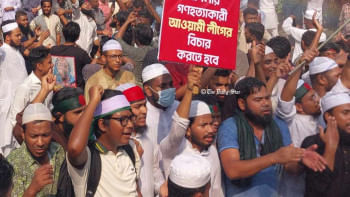Witnesses not reliable
The defence of war crimes accused Ghulam Azam yesterday told Tribunal-1 that their client had not committed any offence under International Crimes (Tribunals) Act, 1973, but he committed crimes under the Collaborators Act, 1972.
Meanwhile, the defence of war crimes accused Jamaat-e-Islami leader Muhammad Kamaruzzaman during closing arguments at International Crimes Tribunal-2 yesterday hinted at “contradictions” between testimonies of prosecution witnesses.
The defence of Ghulam Azam yesterday placed closing arguments on legal points all day long at International Crimes Tribunal-1.
Defence counsel Imran Siddiq yesterday told the tribunal that during the Liberation War in 1971 Ghulam Azam referred to freedom fighters as “separatists” or “miscreants”, not any particular group of people.
He then argued that Ghulam Azam by asking the then government to take action against freedom fighters had not committed any offence under the international crimes act, on which the tribunals have been set up. It was, however, a crime under the collaborators act, added the defence counsel.
Counsel Imran claimed that the investigation officer of the case failed to understand genocide, therefore he failed to provide evidence to prove the genocide charge against his client.
The defence counsel also argued that the charges were not framed properly to prove crimes against humanity.
The proceeding of the case was adjourned until Sunday.
Former Jamaat chief Ghulam Azam is facing five charges for planning, inciting, conspiring to commit crimes against humanity and complicity in the killing of 38 people in Brahmanbaria.
Earlier, the tribunal adjourned the hearing on charge framing against war crimes suspect Mobarak Hossain until April 10. Mobarak, who was organising secretary of a union unit of Awami League in Akhaura for 16 years, was brought before the tribunal yesterday.
The tribunal also adjourned the war crimes case against BNP leader Salauddin Quader Chowdhury until Monday.
At Tribunal-2 yesterday, the defence of Kamaruzzaman completed closing arguments on two out of the seven war crimes charges against him.
On his second day of submission, chief defence counsel Abdur Razzaq argued on the first, second and third charges against Kamaruzzaman.
The three-member tribunal led by Justice Obaidul Hassan with members Justice Md Mozibur Rahman Miah and M Shahinur Islam adjourned the case proceeding until 2:00pm Monday, when the defence is expected to place further arguments.
Completing his arguments on the first charge, Razzaq argued on the third charge against his client.
On the third charge, Razzaq said six prosecution witnesses, including three women from Sohagpur, had testified but there were “many contradictions” in their testimonies and they “contradicted” with each other and with their statements given before investigation officer of the case.
“They are not reliable witnesses,” Razzaq claimed.
The third charge says: Kamaruzzaman on July 25, 1971, advised members of Al-Badr and Razakar forces to commit a large-scale massacre in association with the Pakistan troops in Sohagpur village in Sherpur. The collaborators murdered 164 unarmed civilians, 44 of whom have been named, and raped several women.
The second charge says: Kamaruzzaman and his accomplices in mid-May, 1971, forced pro-liberation intellectual Syed Abdul Hannan, the then principal of Sherpur College, to walk almost naked through the town while he was being whipped constantly.
Second prosecution witness Monowar Hossain Khan alias Mohan Munshi, third witness Jahurul Haque Munshi, Bir Pratik, and 14th witness Majibar Rahman Khan Panu testified supporting the charge.
Referring to their testimonies, Razzaq said, “There are serious contradictions in their testimonies and they did not corroborate each other.”
Arguments on the second charge were put on hold as the tribunal adjourned at 4:00pm.
Earlier, Razzaq said he would require two more days to complete his arguments. After defence arguments, prosecution may respond if they feel the necessity, as they have already completed their closing arguments.
The tribunal would fix a date for delivering the verdict in the case after the completion of closing arguments.

 For all latest news, follow The Daily Star's Google News channel.
For all latest news, follow The Daily Star's Google News channel. 



Comments